 W
WGeorge Keppel, 3rd Earl of Albemarle KG PC, styled Viscount Bury until 1754, was a British general and nobleman. He is best known for his decisive victory over the Spanish during capture of Havana in 1762, as part the Seven Years' War.
 W
WLieutenant-General Willem Anne van Keppel, 2nd Earl of Albemarle was a British soldier, diplomat and courtier.
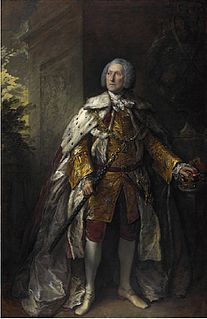 W
WGeneral John Campbell, 4th Duke of Argyll KT PC, was a British Army officer and Scottish Whig politician who sat in the House of Commons between 1713 and 1761. From 1729 to 1761 he was known as John Campbell of Mamore.
 W
WGeneral William Belford was a British artillery officer who began his career in 1726. He was part of the first generation of artillery officers selected and promoted on merit, rather than connections.
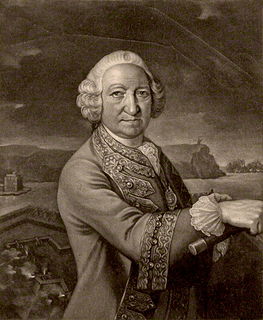 W
WLieutenant General Sir William Blakeney, 1st Baron Blakeney, KB, 7 September 1672 to 20 September 1761, was an Irish-born officer, who served in the British army from 1695 until 1756. He was Member of Parliament for Kilmallock from 1725 to 1757, although rarely attended.
 W
WLieutenant General Humphrey Bland was an Irish-born professional soldier, whose career in the British Army began in 1704 during the War of the Spanish Succession and ended in 1756.
 W
WField Marshal John Campbell, 5th Duke of Argyll, styled Marquess of Lorne from 1761 to 1770, was a Scottish soldier and nobleman. After serving as a junior officer in Flanders during the War of the Austrian Succession, he was given command of a regiment and was redeployed to Scotland where he opposed the Jacobites at Loch Fyne at an early stage of the Jacobite Rebellion and went on to fight against them at the Battle of Falkirk Muir and then at the Battle of Culloden. He later became adjutant-general in Ireland and spent some 20 years as a Member of Parliament before retiring to Inveraray Castle.
 W
WLieutenant-General Charles Schaw Cathcart, 9th Lord Cathcart, KT was a British soldier and diplomat. He was also chief of the Clan Cathcart.
 W
WJames Cholmondeley was a British Army officer and Member of Parliament between 1731 and 1747.
 W
WGabriel Christie was a British Army General from Scotland, who settled in Montreal after the Seven Years' War. Following the British Conquest of New France, he invested in land and became one of the largest landowners in the British Province of Quebec.
 W
WField Marshal Henry Seymour Conway was a British general and statesman. A brother of the 1st Marquess of Hertford, and cousin of Horace Walpole, he began his military career in the War of the Austrian Succession. He held various political offices including Chief Secretary for Ireland, Secretary of State for the Southern Department, Leader of the House of Commons and Secretary of State for the Northern Department. He eventually rose to the position of Commander-in-Chief of the Forces.
 W
WLieutenant-General Sir Eyre Coote, KB was a British soldier and politician who sat in the House of Commons from 1768 to 1780. He is best known for his many years of service with the British Army in India. His victory at the Battle of Wandiwash is considered a decisive turning point in the struggle for control in India between Britain and France. He was known by his sepoy troops as Coote Bahadur.
 W
WSir John Cope (1688–1760) was a British soldier, and Whig Member of Parliament, representing three separate constituencies between 1722 and 1741. He is chiefly remembered for his defeat at Prestonpans, the first significant battle of the Jacobite rising of 1745.
 W
WEdward Cornwallis was a British career military officer and was a member of the aristocratic Cornwallis family, who reached the rank of Lieutenant General. After Cornwallis fought in Scotland, putting down the Jacobite rebellion of 1745, he was appointed Groom of the Chamber for King George II. He was then made Governor of Nova Scotia (1749–1752), one of the colonies in North America, and assigned to establish the new town of Halifax, Nova Scotia. Later Cornwallis returned to London, where he was elected as MP for Westminster and married the niece of Robert Walpole, Great Britain's first Prime Minister. Cornwallis was next appointed as Governor of Gibraltar.
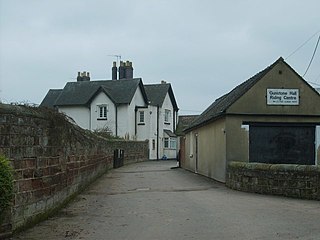 W
WLieutenant General Thomas Fowke, also spelt Foulks, circa 1690 to 29 March 1765, was a British military officer of the 18th century. He was Governor of Gibraltar from 1753 to 1756, and twice court-martialled during his service.
 W
WGeneral Thomas Gage was a British Army general officer and colonial official best known for his many years of service in North America, including his role as British commander-in-chief in the early days of the American Revolution.
 W
WColonel James Gardiner was a Scottish soldier who fought in the British Army, including during the 1745 Jacobite rising, in which he was killed at the Battle of Prestonpans.
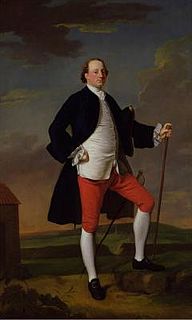 W
WLieutenant-General John Manners, Marquess of Granby, was a British soldier and the eldest son of the 3rd Duke of Rutland. As he did not outlive his father and inherit the dukedom, he was known by his father's subsidiary title, Marquess of Granby.
 W
WSir Peter Halkett, 2nd Baronet was a Scottish baronet who served in the British army and was Member of Parliament for Stirling Burghs from 1734-1741.
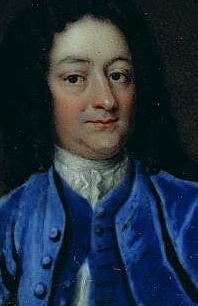 W
WLieutenant General Henry Hawley was a British army officer who served in the wars of the first half of the 18th century. He fought in a number of significant battles, including the Capture of Vigo in 1719, Dettingen, Fontenoy and Culloden.
 W
WField Marshal Studholme Hodgson was a British Army officer who served during the 18th century. After serving as an Aide-de-Camp to the Duke of Cumberland at the Battle of Fontenoy during the War of the Austrian Succession and at the Battle of Culloden during the Jacobite Rebellion, he became correspondent to William Barrington, the Secretary at War, during the French and Indian War. He went on to command the British expedition which captured Belle Île in June 1761 during the Seven Years' War so enabling the British Government to use the island as a bargaining piece during the negotiations leading up to the Treaty of Paris in 1763.
 W
WRev John Home FRSE was a Scottish minister, soldier and author. His play Douglas was a standard Scottish school text until the Second World War, but his work is now largely neglected. In 1783 he was one of the joint founders of the Royal Society of Edinburgh.
 W
WLieutenant General William Home, 8th Earl of Home was a Scottish peer and the British Governor of Gibraltar between 1757 and 1761. Lord Home was a well-known spendthrift.
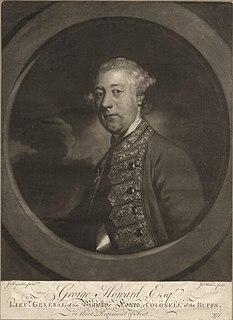 W
WField Marshal Sir George Howard KB, PC was a British military officer and politician. After commanding the 3rd Regiment of Foot at the Battle of Fontenoy in May 1745 during the War of the Austrian Succession and after commanding that regiment again at the Battle of Falkirk Muir and the Battle of Culloden during the Jacobite Rebellion, he returned to the continent and fought at the Battle of Lauffeld. He went on to command a brigade at the Battle of Warburg during the Seven Years' War. He subsequently became the Governor of Minorca.
 W
WLieutenant General John Huske was a British military officer, whose active service began in 1707 during the War of the Spanish Succession, and ended in 1748.
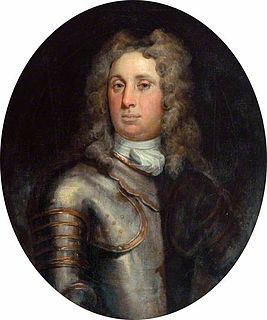 W
WLieutenant-General Peregrine Lascelles (1685–1772), also spelt Lascells, was a British military officer from Yorkshire.
 W
WMajor-General Stringer Lawrence was an English soldier, the first Commander-in-Chief, India
 W
WGeneral William Henry Kerr, 4th Marquess of Lothian was a Scottish nobleman, British soldier and politician, the eldest son of William Kerr, 3rd Marquess of Lothian. He was styled Master of Jedburgh until 1722, Lord Jedburgh from 1722 to 1735, and Earl of Ancram from 1735 to 1767. As the Earl of Ancram, he distinguished himself during the War of the Austrian Succession.
 W
WGeneral John Campbell, 4th Earl of Loudoun was a Scottish nobleman and army officer.
 W
WGeneral Alexander Mackay was a Scottish soldier in the British Army, and a politician. The son of George Mackay, 3rd Lord Reay, he was the younger brother of George Mackay of Skibo (c.1715–1782).
 W
WGeneral Robert Melvill LLD was a Scottish soldier, antiquary, botanist and inventor.
 W
WGeneral Sir John Mordaunt was a British soldier and Whig politician, the son of Lieutenant-General Harry Mordaunt and Margaret Spencer. He was best known for his command of the Raid on Rochefort which ended in failure and his subsequent court-martial. Cleared on a technicality, he was nonetheless barred from holding further military command.
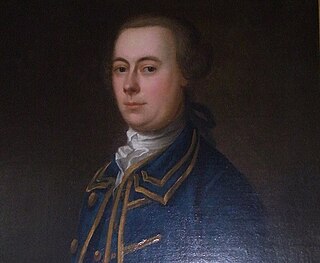 W
WSir Harry Munro, 7th Baronet was 25th Baron and the 28th chief of the Clan Munro. He was a Scottish soldier and politician. He was loyal to the Hanoverian dynasty and served as a captain in Loudon's Highlanders Regiment 1745–48.
 W
WSir Robert Munro of Foulis, 6th Baronet was a soldier-politician whose life followed an 18th-century pattern. He fought in support of the Revolution Settlement and the House of Hanover, and their opposition to all attempts by the Jacobites to restore the House of Stuart either by force of arms or by political intrigue.
 W
WAlexander Murray was a British army officer who served in Father Le Loutre's War and the French and Indian War in Nova Scotia. He was the cousin of James Murray.
 W
WJames Edward Oglethorpe was a British soldier, Member of Parliament, and philanthropist, as well as the founder of the colony of Georgia in what was then British America. As a social reformer, he hoped to resettle Britain's worthy poor in the New World, initially focusing on those in debtors' prisons.
 W
WJohn Parr was a British military officer and governor of Nova Scotia. He is buried in the crypt of St. Paul's Church (Halifax).
 W
WGeneral Harry Pulteney was an English soldier and Member of Parliament.
 W
WJohn Reid, previously known as John Robertson, was a British army general and founder of the chair of music at the University of Edinburgh.
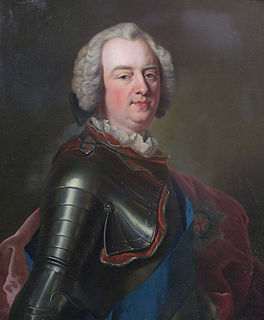 W
WCharles Lennox, 2nd Duke of Richmond, 2nd Duke of Lennox, 2nd Duke of Aubigny, of Goodwood House near Chichester in Sussex, was a British nobleman and politician. He was the son of Charles Lennox, 1st Duke of Richmond, 1st Duke of Lennox, the youngest of the seven illegitimate sons of King Charles II. He was the most important of the early patrons of the game of cricket and did much to help its evolution from village cricket to first-class cricket.
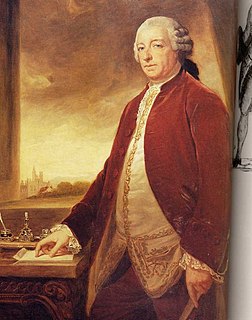 W
WGeorge Germain, 1st Viscount Sackville, PC, styled The Honourable George Sackville until 1720, Lord George Sackville from 1720 to 1770 and Lord George Germain from 1770 to 1782, was a British soldier and politician who was Secretary of State for America in Lord North's cabinet during the American War of Independence.
 W
WLeonard Smelt was a British Army officer. He also served as sub-governor to Frederick, Duke of York and the future George IV.
 W
WField Marshal George Townshend, 1st Marquess Townshend, PC, known as The Viscount Townshend from 1764 to 1787, was a British soldier and politician. After serving at the Battle of Dettingen during the War of the Austrian Succession and the Battle of Culloden during the Jacobite Rising, Townshend took command of the British forces for the closing stages of the Battle of the Plains of Abraham during the Seven Years' War. He went on to be Lord Lieutenant of Ireland or Viceroy where he introduced measures aimed at increasing the size of Irish regiments, reducing corruption in Ireland and improving the Irish economy. In cooperation with Prime Minister North in London he solidified governmental control over Ireland. He also served as Master-General of the Ordnance, first in the North Ministry and then in the Fox–North Coalition.
 W
WGeneral Cyrus Trapaud was a British Army officer.
 W
WField Marshal George Wade was a British Army officer who served in the Nine Years' War, War of the Spanish Succession, Jacobite rising of 1715 and War of the Quadruple Alliance before leading the construction of barracks, bridges and proper roads in Scotland. He went on to be a military commander during the War of the Austrian Succession and Commander-in-Chief of the Forces during the Jacobite rising of 1745.
 W
WPrince William Augustus, Duke of Cumberland, was the third and youngest son of King George II of Great Britain and Ireland and his wife, Caroline of Ansbach. He was Duke of Cumberland from 1726. He is best remembered for his role in putting down the Jacobite Rising at the Battle of Culloden in 1746, which made him immensely popular throughout parts of Britain. He is often referred to by the nickname given to him by his Tory opponents: 'Butcher' Cumberland. Despite his triumph at Culloden, he had a largely unsuccessful military career. Between 1748 and 1755 he attempted to enact a series of army reforms that were resisted by the opposition and by the army itself. Following the Convention of Klosterzeven in 1757, he never again held active military command and switched his attentions to politics and horse racing.
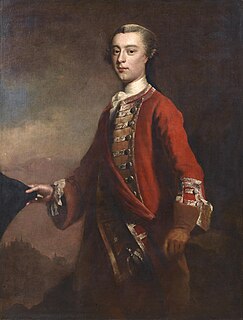 W
WJames Wolfe was a British Army officer known for his training reforms and remembered chiefly for his victory in 1759 over the French at the Battle of the Plains of Abraham in Quebec as a major general. The son of a distinguished general, Edward Wolfe, he received his first commission at a young age and saw extensive service in Europe during the War of the Austrian Succession. His service in Flanders and in Scotland, where he took part in the suppression of the Jacobite Rebellion, brought him to the attention of his superiors. The advancement of his career was halted by the Peace Treaty of 1748 and he spent much of the next eight years on garrison duty in the Scottish Highlands. Already a brigade major at the age of 18, he was a lieutenant-colonel by 23.
 W
WMajor-General Richard Alchorne Worge was an English General in the British Army, Governor of Senegal and a Member of Parliament for Stockbridge.